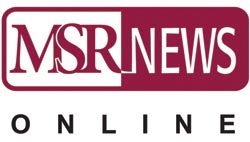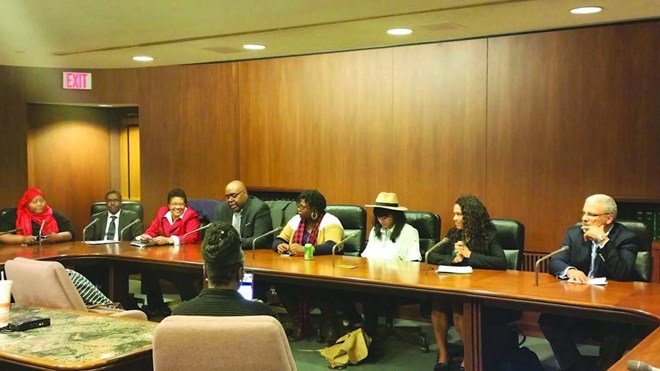
Saturday April 16, 2016
By Julia Johnson
Black leaders collaborate to reduce state’s race disparities

Fardousa Jama, a leader in the Makato Somali community, Abdirizak Bihi of the Somali Education and Social Advocacy Center, Cindy Booker of Sabathani Community, Steve Belton of Minneapolis Urban League, Asha Long and Mica Grimm of Black Lives Matter Minneapolis, Kristal Porter, and Jeffrey Hassan of African American Leadership Forum. (Photo by Julia Johnson/MSR News)
At the State Capitol on April 6 several leaders in the Black community held a press conference to unveil a United Black Legislative Agenda. According to several legislators, this event had the highest turnout of African Americans at the State Capitol in recent times regarding issues concerning the Black community.The meeting was in response to Gov. Mark Dayton’s pledge of $100 million to address the issues concerning racial disparities in Minnesota. The purpose of the Legislative Agenda is to provide a set of pragmatic policy solutions led and shaped by the Black community. The Agenda is the result of a collaborative effort agreed upon by Black community leaders throughout the state of Minnesota.Economic justice
One of the Agenda items presented at the press conference was an economic justice initiative. It focuses on the creation of a business capital fund to support African and African American businesses. It also recommends creation of an urban initiative board for workforce development. The initiative would include support for a summer jobs program in Minneapolis and St. Paul that would target youth of color ages 16-19, a group that currently has an unemployment rate of 23.1 percent, double that of their White counterparts.
Criminal justice
The second item on the Agenda focused on the criminal justice system. It included a grand jury ban for police involved in criminal proceedings and a ban on private prisons and corporations financially benefitting from the incarceration of Blacks and other people of color. Under this Agenda, the community leaders also suggest changing sentencing as the rate of growth of incarceration is unsustainable and disproportionately impacts Black communities.
Community leaders also addressed Voting Rights Restoration, based on the 47,000 Minnesotans denied the right to vote after serving time. Once released, former offenders are expected to pay taxes, yet they are denied a voice through voting in how taxes are spent. The last item under the criminal justice Agenda is to establish a strong body camera policy along with funding.
Immigrant justice
The United Black Legislative Agenda concluded with the issue of Black Immigrant Justice. The Agenda focused on Islamophobia, anti-Muslim and anti-immigrant sentiments, which have been on the rise across the country. The Agenda included a focus on the Somali community’s needs for job training, youth development and education.
MSR asked some of the leaders present to address other initiatives not brought up in the press conference.
Kristal Porter has been a part of this initiative from its inception, saying she and Al Flowers worked together to organize all of the leaders in the community. “Al Flowers and I rounded people from education, Black Nurses Association, and so much more to focus on these issues,” Porter said.
“What we are really looking to do here is provide a platform for African Americans and Africans all over the state to make sure that the concerns that they have are being addressed,” said Steve Belton, president and CEO of the Minneapolis Urban League and one of leaders in the Agenda. “Also the first Agenda was to show a picture of a united front, which says, ‘See the picture of a united community, not a divided front.’
“It’s not an African American issue verses African issue,” Belton continued. “It says we are all in the struggle and we all have things in common.”
Asked who the main players are in the organization, Belton responded, “It’s an organic group. I don’t know who the main players are. There are people who are supportive and have a lot of energy behind particular issues.
“The Somalis are very concerned about Black immigrant justice issues,” said Belton. “On the same token, you have groups like NOC [Neighborhoods Organizing for Change] and Black Lives Matter that are very concerned about criminal justice issues. And the Urban League is very interested in all of these issues.”
Asked who will be controlling the funds, Belton explained that since there are so many organizations that are a part of the initiative, the legislature will make the determination. “Each individual senator and representative will write in their respective bills…their financial controls as to what agent receives the funds.”
Community members behind the United Black Legislative Agenda agree, as stated in the Agenda, “that with a state surplus of nearly $1 billion, we believe that there is no better time to align our legislative priorities with the deliberate and specific needs of our most under-resourced communities.”